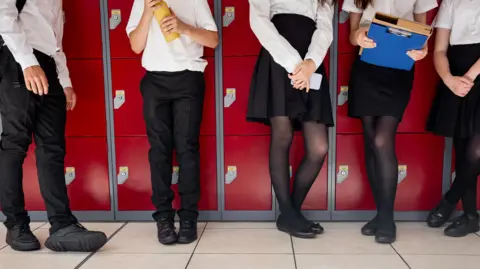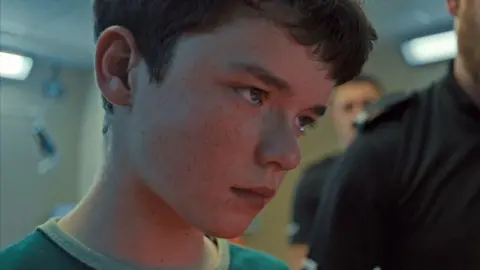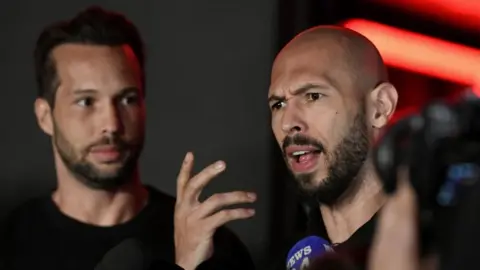'Girls weren't treated like they were human'
 Getty
GettyIn response to the hit Netflix series Adolescence, a Brighton mother has told the BBC she withdrew her son from school as she was so concerned about violence, misogyny, racism and homophobia.
Her 14-year-old son, who is now home-schooled, said: "Girls weren't really treated equally, it was like they were not really humans."
Secondary school staff have also spoken out about the "avalanche" of issues in schools caused by social media, misogynistic behaviour and toxic masculinity.
The Department for Education said it had issued guidance on incel (involuntarily celibate) culture to teachers aimed at recognising signs of students engaging in misogynistic content and providing safeguarding advice.
Warning: This article contains content some readers may find distressing.
Adolescence has sparked a national conversation about the dangers of social media, knife crime, toxic influencers and the rise of misogyny in schools.
A survey from trade union Unison in March 2024 found that a quarter of secondary school support staff nationally had witnessed sexual harassment in institutions in the past five years.
The mother - who we are not naming - said Adolescence had resonated with both her and her son.
She said: "There was a lot of violent discussion, a lot of homophobia, racism, mentions of knives and disgusting comments about girls by boys.
"I didn't want him sucked into that world and becoming brainwashed by it."
 Netflix
NetflixThe boy, also not being named, said the school environment portrayed in Adolescence was "very accurate" and children did "whatever they want".
He said the most teachers would do is give detentions and it felt like students had "infinite power".
He said there was a big divide between boys and girls in secondary school but being home-schooled meant "everyone is an actual human".
He said he frequently heard students talking about knife crime.
Teacher 'had bum slapped'
Female teachers have also reported instances of being sexually assaulted by pupils as well as dealing with incidents between students.
One former teacher, who worked at a secondary school in Sussex but has since left the profession, said: "I had my bum slapped and pinched by male students and the only punishment was they were told to apologise to me.
"A lot of the time the only consequences would be to put them in isolation for the day."
The Unison survey found that one in ten female staff members had been sexually harassed.
In another incident, the former teacher alleged a boy had to be restrained after trying to attack a female student while holding a pair of scissors because she rejected him as her prom date.
'Radicalising figures'
The Unison survey added that more than half of staff had also noticed changes in pupil's behaviour linked to sexist content online.
The boy we spoke to said there was a lack of role models both in school and generally which encouraged boys to turn to social media and figures such as Andrew Tate, a self-proclaimed misogynist.
The BBC heard from one parent whose son in Year 1 had heard the word "Sigma" from other pupils - language used by Tate to describe a male who is a "lone wolf".
One special educational needs co-ordinator (Senco) at a Hampshire school said: "We are facing an avalanche of social media.
"These figures are holding themselves up as successful people with fast cars and successful lives.
"They are promoting a route of how to achieve that successful lifestyle which worries me.
"I wouldn't want children to see those people and their lives as aspirational."
 Eduard Vinatoru/Reuters
Eduard Vinatoru/ReutersPhil Clarke, south east regional secretary from the National Education Union (NEU) said most school staff would recognise from their own experience the harmful impact on our children from figures such as Tate.
He added: "Material online has become increasingly violent and sexist and it is those working in our schools with young people who have to try and make sure that education can take place in a space that is respectful and tolerant of others."
He said surveys showed this was affecting primary pupils as well as secondary, changing the way that children play together and how girls feel about themselves.
"Our children deserve better than this," he said.
If you have been affected by issues raised in this article, you can find more information and support from the BBC Action Line.
Education Secretary Bridgette Phillipson said: "I've heard first-hand from teachers that the rise of dangerous influencers is prompting a crisis in the radicalisation of young boys – which is why our mission to halve violence against women and girls in a decade is so vital.
"These vile, misogynistic views are not innate, they are learned, so through our review of the relationships, sex and health curriculum we'll be taking robust action to better help young people understand healthy relationships, consent and misogyny, and have produced a new guide for teachers on recognising the signs and intervening early on incel ideologies.
"But this behaviour is not limited to the classroom; the evidence is increasingly clear that we shouldn't be allowing children unrestricted access to harmful content, which is why we are bringing in much wider protection for children with the Online Safety Act."
Follow BBC Sussex on Facebook, on X, and on Instagram. Send your story ideas to [email protected] or WhatsApp us on 08081 002250.
